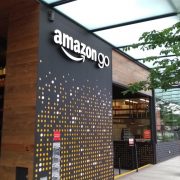Physical Retail Stores Are Getting Smarter about Competing with Amazon
Healthy competition makes every single one of us better. It allows us to come to terms with our limitations and challenges us to push ourselves to achieve bigger better things. And it is competition that drives the market and technological innovations that make our world more wondrous with each passing year.
However, competition is not always welcomed by businesses that have long dominated their industry and thus feel as though they have earned some sort of market tenure.
However, after losing consumers to the convenience of Amazon and online retail in general, many brick and mortar locations are finally realizing that they must either innovate or cease to exist. And this change in attitude is in part thanks to the new Amazon Go location in Seattle.
Amazon Go
Amazon has completely changed the way consumers purchase items, and brick and mortar retail establishments are not happy about it. Amazon is great at what it does, so much so that consumers prefer to order almost everything they could ever want online from the comfort of their homes, rather than patronize physical establishments. But more Amazon shoppers means fewer people visiting physical stores. This has caused so much outrage, even President Trump has chimed in on Twitter, calling for a regulatory crackdown on Amazon.
Yet, even in the era of abandoned shopping malls and dying retail chains, Amazon has found a way to reinvent the brick and mortar experience with its new Amazon Go location. And this new Amazon experience is finally forcing some retail locations to raise their game.
Amazon Go is unlike any other store you have ever visited. Completely automated, Amazon Go puts the shoppers in control of their experience. To enter the store, each shopper must scan the Amazon Go app on their smartphone. After gaining entry, shoppers need only grab what they want, and then leave the premises. It’s as simple as that. The store shelves have sensors that know when a shopper has picked up an item. If the shopper changes his or her mind and returns an item to the shelf, their Amazon Go cart will adjust the total accordingly. And since the app is connected to their debit or credit cards, payment occurs automatically and without having to wait to see a cashier or use the self-checkout.
The Uber Example
The most obvious modern example of businesses trying to avoid healthy competition is the “Uber vs. Taxi” war that has raged over the last several years. The taxi companies had enjoyed an 80-year stranglehold on the market simply because there was no better way of doing things at the time. But instead of encouraging innovation, protectionist policies like New York’s infamous medallion laws limited who could enter the market, so as not to threaten those already in it. But this gave these existing taxi companies absolutely no incentive to change.
So when ridesharing came into existence, rather than innovate their own outdated models, cab companies used the state to attempt to regulate ridesharing out of existence. They didn’t see this competition as a challenge to grow, but as a threat to be nipped in the bud, even though it meant limiting consumer choice.
However, even though the big cab companies did enjoy mild regulatory success, consumers were still crazy about Uber and Lyft, preferring them to hailing a cab, which allowed ridesharing to triumph in the face of protectionism.
And while the cab industry’s war on Uber has subsided a bit, a new battle is occurring between Amazon and traditional retail establishments.
Competing with Amazon
As Martin Hitch, the chief business officer of Bossa Nova Robotics, a company that works with stores like Walmart to help with inventory management commented on Amazon Go, saying:
“Unanimously, there was an element of embarrassment because here is an online retailer showing us how to do brick and mortar, and frankly doing it amazingly well.”
Retail companies who have managed to stay afloat in the era of online shopping would do well to take notes from Amazon Go’s model, as Hitch points out. And this is exactly what Walmart and other retail stores around the globe are looking into and trying out now. Specifically, China retailers are aggressively innovating their own models to compete with the Amazon.
The Chinese startup Bingo Box is aiming to open 100 automated grocery stores that function almost exactly like Amazon Go. The Chinese retailer, JD, is also moving towards automation by putting chips in all its retail items, making the scanning and checkout process easier. Additionally, Alibaba, one of the largest internet companies in China, has announced it will be opening 35 of its own automated stores that will allow customers to order groceries on a mobile app in advance, and then use facial recognition to complete the checkout process once in the store.
And in the United States, grocery giant Walmart is considering similar moves.
Already, Hitch has helped Walmart move towards more automation in select stores. So far, this new plan would utilize robots to keep tabs on inventory as well as mislabeled products. It would also allow shoppers to use their smartphones to pay for the items in their cart without having to wait for a cashier. The grocery chain Kroger is also taking this competition with Amazon seriously. Currently, Kroger’s plan is to test mobile purchasing apps in more than 400 of its 2,700 U.S. stores.
This retail competition has also presented new opportunities for startups dedicated to modernizing the way we shop in and check out of physical grocery stores. And while Amazon is taking the lead on automated grocery stores, the race is definitely on to see who will be able to a viable competitor with the online retail giant.
Alan O’Herlihy, as chief executive of the Irish company Everseen, which works with checkout technology for retail stores commented, “There’s a gold rush feeling about this.” And the fact that retail establishments are taking the Amazon Go threat seriously is great news for consumers. Currently, there is only one Amazon Go location in the United States. While it is rumored that there are plans for additional locations, as of now their influence is limited to those in the Seattle area. But if these other retail stores are able to get these new projects up and running, Amazon may finally have a worthy opponent.
One thing that is for certain, more of these futuristic grocery stores means more options for consumers. Prices are likely to go down as stores vie for customers. Amazon Go has finally given brick and mortar stores the stimulus they needed to shake up their outdated models, and this is something to be celebrated.













